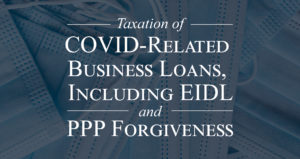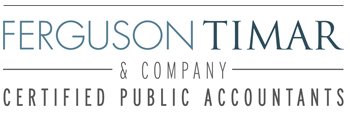
The U.S. Small Business Administration recently reported that in 2021, the SBA oversaw “the distribution of nearly $416.3 billion in emergency relief aid to more than 6 million impacted small businesses” across the U.S. The primary sources of Covid-related emergency aid for small businesses in 2021 were:
- The Paycheck Protection Program (PPP) ($280 billion);
- The COVID Economic Injury Disaster Loan (EIDL) program ($88 billion);
- The COVID EIDL Targeted and Supplemental Advance programs ($6.3 billion combined);
- The Restaurant Revitalization Fund ($28.6 billion); and
- The Shuttered Venue Operators Grant opportunity ($13.4 billion)
Now that the 2021 tax season is underway, many business owners have questions about how the receipt of one or more of these kinds of emergency aid will affect their taxes. If you have similar concerns, know that the dedicated team at Ferguson Timar can provide you with valuable practical support and financial guidance as 2021 tax season deadlines are fast approaching.
Deducting Business Expenses Paid with PPP Loan Funds
Business owners often significantly limit their tax liability by utilizing allowable deductions. Generally speaking, business expenses are tax-deductible. However, there are many exceptions to this general rule, which is one of the many reasons it’s critical to craft a proactive tax strategy with the assistance of financial professionals before committing to any particular business expense.
If your company uses PPP (Paycheck Protection Program) loans to cover business expenses, you may deduct these expenses from your tax liability if certain conditions are met. Your business cannot be publicly traded to qualify for these deductions, and it must meet a 25% gross receipt reduction mandate. Note that if you have used an EIDL grant or Targeted EIDL advance to cover your business expenses, your company will not need to meet these qualifications before deducting allowable expenses.
California Covid-Loan Tax Law: Exclusions from Gross Income
One of the primary ways California has attempted to stabilize business losses incurred by the Covid-19 pandemic involves tax breaks associated with the forgiveness of certain emergency assistance loans and grants. For example, from the tax year 2019 onward, California businesses are not required to list specific loans or grant totals as elements of their gross income for taxation.
Suppose a business has had any of the following loan or grant types partially or fully forgiven. In that case, the forgiven loan amounts may be excluded from gross income calculation: Loans forgiven pursuant to the federal CARES Act (including EIDL grants), the Consolidated Appropriations Act (CAA) of 2021 (including targeted EIDL advances), the Paycheck Protection Program and Health Care Enhancement Act, and the Paycheck Protection Program Flexibility Act of 2020.
Note, however, that California has not chosen to conform to Paycheck Protection Program Extension Act (PPPEA) (Public Law 117-6). This means that California law does not allow businesses to exclude forgiven PPP loans from their gross income for the extension period allowed under the PPPEA.
If your business was granted PPP loans from March 31, 2021, through June 30, 2021 (the PPPEA extension period), any amount of forgiven loans may not be excluded from your gross income for taxation. Only PPP loans granted before March 31, 2021, may be excluded per the above laws. Instead, the team at Ferguson Timar can help you to correctly determine whether these loans may be excluded under Internal Revenue Code (IRC) section 108 rules or whether these totals may benefit from any allowable deductions.
Seeking Covid-Related Taxation Assistance for Your Business
Navigating the federal and California tax codes is no small undertaking for small businesses. Working with the experienced and reputable team at Ferguson Timar will help to ensure that your company benefits from every permissible opportunity to reduce your tax liability. For more information about our efficient, practical approach to managing business tax liability concerns, connect with our team via email or give us a call at (714) 204-0100.
We look forward to speaking with you.
